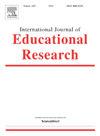Impact of social jetlag and chronotype on leisure activities in Brazilian high school students
IF 2.5
3区 教育学
Q1 EDUCATION & EDUCATIONAL RESEARCH
引用次数: 0
Abstract
Adolescents often experience a misalignment between their biological rhythms (chronotype) and societal schedules, leading to social jetlag, which may impact stress, resilience and well-being. This study investigated the relationships between chronotype, perceived stress, resilience, sleep quality and leisure activity choices among Brazilian high school students. Ninety 11th-grade students (aged 16–17) completed validated questionnaires assessing these factors. Most students exhibited an intermediate chronotype. While morning types reported lower stress, higher resilience and better sleep quality, evening chronotypes showed significantly higher stress, lower resilience and poorer sleep outcomes. Leisure activities varied by chronotype: morning types engaged more in physical activities and academic tasks, while evening types prioritised social interactions and entertainment. Gender differences were also evident, with girls reporting higher stress and lower resilience than boys. The findings underscore the influence of chronotype on adolescent well-being and highlight the opportunities for educational policies that consider biological rhythms. Addressing social jetlag through flexible school schedules and promoting structured leisure activities may enhance resilience, reduce stress and support healthier lifestyle habits in adolescents.
社会时差和时间类型对巴西高中生休闲活动的影响
青少年经常会经历生物节律(生物钟)和社会时间表之间的不协调,导致社会时差,这可能会影响压力、适应力和幸福感。本研究调查了巴西高中生的睡眠类型、感知压力、恢复力、睡眠质量和休闲活动选择之间的关系。90名11年级学生(16-17岁)完成了评估这些因素的有效问卷。大多数学生表现出中等时型。早起型的人压力更小,适应能力更强,睡眠质量更好,而晚睡型的人压力更大,适应能力更低,睡眠质量更差。休闲活动因时间类型而异:早起的人更多地参与体育活动和学术任务,而晚睡的人则优先考虑社交和娱乐。性别差异也很明显,与男孩相比,女孩的压力更大,适应力更低。研究结果强调了睡眠类型对青少年健康的影响,并强调了考虑生物节律的教育政策的机会。通过灵活的学校安排和促进有组织的休闲活动来解决社会时差问题,可以增强青少年的适应能力,减轻压力,并支持他们养成更健康的生活习惯。
本文章由计算机程序翻译,如有差异,请以英文原文为准。
求助全文
约1分钟内获得全文
求助全文
来源期刊

International Journal of Educational Research
EDUCATION & EDUCATIONAL RESEARCH-
CiteScore
6.20
自引率
3.10%
发文量
141
审稿时长
21 days
期刊介绍:
The International Journal of Educational Research publishes regular papers and special issues on specific topics of interest to international audiences of educational researchers. Examples of recent Special Issues published in the journal illustrate the breadth of topics that have be included in the journal: Students Perspectives on Learning Environments, Social, Motivational and Emotional Aspects of Learning Disabilities, Epistemological Beliefs and Domain, Analyzing Mathematics Classroom Cultures and Practices, and Music Education: A site for collaborative creativity.
 求助内容:
求助内容: 应助结果提醒方式:
应助结果提醒方式:


